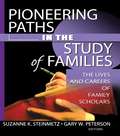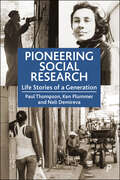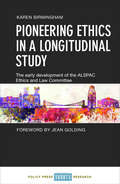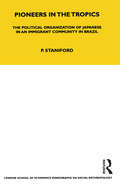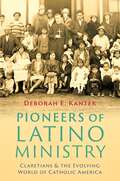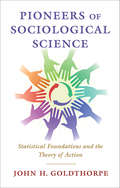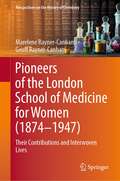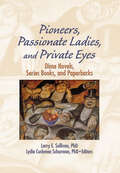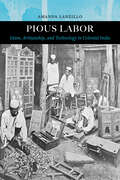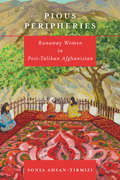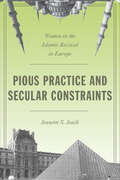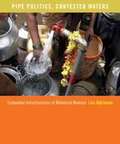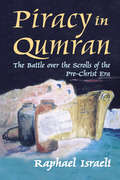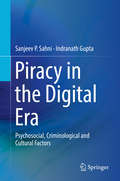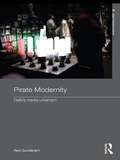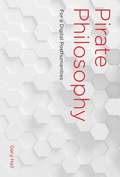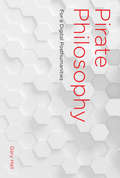- Table View
- List View
Pioneering Paths in the Study of Families: The Lives and Careers of Family Scholars
by Gary W Peterson Suzanne SteinmetzMeet the men and women whose groundbreaking work elevated the field of family studies! In Pioneering Paths in the Study of Families: The Lives and Careers of Family Scholars, you'll find 40 autobiographies written by leading scholars in sociology, family studies, psychology, and child development. Their fascinating stories demonstrate how their family experiences, educational opportunities, and occupational endeavors not only shaped the disciplines they chose but also shaped the theoretical perspectives they utilized and the topics they researched. From the editors: "These autobiographies document the experiences of scholars from the early twentieth century to the present. The descriptions of early influences on their education, of their graduate school experiences, and of their academic career paths, provides a wealth of valuable material. Since four of these scholars have died and a number are in their eighties or older, these histories provide rich case studies on factors that influence the decision to go to college, get married, pursue an advanced degree, make specific occupational choices, and investigate certain topics. These autobiographies also detail the barriers that early women scholars in the social sciences faced." The scholars whose lives you will learn about in Pioneering Paths in the Study of Families include: Joan Aldous Katherine R. Allen Pauline Boss Carlfred B. Broderick Wesley R. Burr Catherine Street Chilman Harold T. Christensen Marilyn Coleman Rand D. Conger Randal D. Day William J. Doherty Evelyn Millis Duvall Glen H. Elder, Jr. Bernard Farber Margaret Feldman Mark A. Fine Greer Litton Fox Frank F. Furstenberg Viktor Gecas Harold D. Grotevant Gerald Handel Michael E. Lamb Ralph LaRossa Gary R. Lee Helena Znaniecka Lopata Harriette P. McAdoo Hamilton McCubbin Brent C. Miller Phyllis Moen Gerhard Neubeck Gary W. Peterson Ira L. Reiss John Scanzoni Walter R. Schumm Barbara H. Settles Laurence Steinberg Suzanne K. Steinmetz Sheldon Stryker Marvin B. Sussman Irv Tallman
Pioneering Social Research: Life Stories of a Generation
by Paul Thompson Ken PlummerPresenting the landmark Pioneers life stories project, this one-of-a-kind book documents how modern social research in the UK was shaped. It sheds new light on the lives, methods and motivations of men and women who helped develop a new world of research methodology, pioneered feminist research, and first confronted the issues of race and ethnicity. It combines a fascinating history of the generations who built outstanding and influential social research with a valuable resource for future research and teaching on methods.
Pioneering ethics in a longitudinal study: The early development of the ALSPAC Ethics and Law Committee
by Karen BirminghamAvailable Open Access under CC-BY-NC licence. The Avon Longitudinal Study of Parents and Children (ALSPAC), also known as Children of the 90s, is a world-leading birth cohort study that uniquely enrolled participants in utero and obtained genetic material from a geographic population. It instigated the innovative but controversial ALSPAC Ethics and Law Committee. This book describes in detail the early work of this Committee, from establishing the core ethical principles necessary to protect participants, to the evolution of policies concerning confidentiality and anonymity, consent, non-intervention and disclosure of individual results, data access and security. Quotes from interviews with early members of the Committee reflect not only on its pioneering work but also on the unusual style and inspirational leadership of the first Chair, Professor Michael Furmston. This will be of interest to those involved in other cohort studies in understanding the evolution of ethical policies as ALSPAC developed.
Pioneers in the Tropics: The Political Organisation of Japanese in an Immigrant Community in Brazil (LSE Monographs on Social Anthropology #No. 45)
by Philip StanifordThis study of a substantial Japanese immigrant community in Brazil concentrates on its development of a political organization to cope with internal problems of co-operation and conflict and to deal with the outside world of Brazilian politicians and merchants. After many early troubles the immigrants developed pepper growing as a cash crop and now seem on the way to prosperity. The analysis, which makes use of the concept of network interaction, is of relevance to all interested in community migration and development of new rural settlements.
Pioneers of Latino Ministry: Claretians and the Evolving World of Catholic America
by Deborah E. KanterTraces the history of the Claretian Missionaries and their far-reaching influence on Latino CatholicsPioneers of Latino Ministry tells the story of the Claretian Missionaries, a male Catholic congregation, dedicated to Latin American immigrants and their families on the margins of US society since 1902. The Claretians’ accompaniment of Latinos makes them distinct in American Catholic history. When the first Claretians arrived from Mexico, Spanish speakers were a small, often unrecognized part of Catholic America. Today Latinos constitute half of US Catholics. The Claretians inaugurated parishes and schools in over fifteen states. Their outreach was felt in wider Catholic America as they published popular magazines, created missions in Central America, and fostered a now wide-spread devotion to St. Jude. They cultivated respect and dignity for Latino people in regions where wider society marginalized the newcomers. Because they encouraged education and leadership within their parishes, many Latinos emerged to lead and enhance US Catholic life as priests, female religious, and lay leaders. Today, the Claretians have circled back to their original mission in the US: committed to new generations of immigrants and their children. Pioneers of Latino Ministry charts the history of the Claretians and their influence on Latino Catholics in the US, as well as on broader American Catholicism. Filled with compelling stories, the volume offers a vital portrait of unexplored Catholic American history.
Pioneers of Mill Creek Canyon
by Shannon WrayThe pioneers of Mill Creek Canyon in the San Bernardino Mountains were visionaries, eccentrics and adventurers. Daniel Sexton married a Native American wife hoping to gain the secret to a mine, while Peter Forsee, a world-weary sheriff, married a widow who was sheltering two outlaw sons. Sylvanus Thurman's burros carried travelers into the wild and sometimes took them for a wild ride. George Burris didn't find gold, but his marble discovery built mansions. D. Rhea Igo created roadside attractions, and Louie Torrey left the city to farm the forest, creating a paradise for his family and others. Join author Shannon Wray as she explores the colorful lives of those who left an indelible mark on Mill Creek Canyon.
Pioneers of Sociological Science: Statistical Foundations and the Theory of Action
by John H. GoldthorpeGoldthorpe reveals the genealogy of present-day sociological science through studies of the key contributions made by seventeen pioneers in the field, ranging from John Graunt and Edmond Halley in the mid-seventeenth century to Otis Dudley Duncan, James Coleman and Raymond Boudon in the late twentieth. Goldthorpe's biographies of these figures and analyses of their work reveal clear lines of intellectual descent, building towards the author's model of sociology as the study of human populations across time and place, previously outlined in his book Sociology as a Population Science (Cambridge, 2015). The extent to which recent developments such as computational sociology and analytical sociology are in continuation with the efforts of these influential thinkers is also critically examined. Pioneers of Sociological Science will appeal to students and scholars of sociology and to anyone engaged in social science research, from statisticians to social historians.
Pioneers of the London School of Medicine for Women: Their Contributions and Interwoven Lives (Perspectives on the History of Chemistry)
by Geoff Rayner-Canham Marelene Rayner-CanhamThis book presents the pioneering role of the women chemists at the London School of Medicine for Women (LSMW). The account is placed within the framework of the long-forgotten background to the founding of this unique Institution, and the individuals whose lives came together to make it happen: Sophia Jex-Blake; Elizabeth Garrett Anderson; Edith Pechey; and Isabel Thorne. The London School of Medicine for Women (LSMW) was the first School in Britain to enable women to gain medical qualifications. Though its pioneering medical role is beginning to be recognized, the Chemistry Department at the School has been totally overlooked. All first-year students at the LSMW had to spend a significant portion of their time taking theoretical and practical chemistry, taught by dedicated women chemistry instructors. In this book, particular attention is given to each of these exceptionally-talented women chemists who found a haven at, and devoted their lives to, the LSMW. This book also covers the enthusiasm of the women medical students which becomes evident through the chemistry prose and poetry which they wrote. This book will appeal to a wide readership interested in the early role of women in science, and it is particularly relevant to those interested in the lives and contributions of pioneering women chemists.
Pioneers, Passionate Ladies, and Private Eyes: Dime Novels, Series Books, and Paperbacks
by Larry E Sullivan Lydia C SchurmanDespite efforts of contemporary reformers to curb the availability of dime novels, series books, and paperbacks, Pioneers, Passionate Ladies, and Private Eyes reveals how many readers used them as means of resistance and how fictional characters became models for self-empowerment. These literary genres, whose value has long been underestimated, provide fascinating insight into the formation of American popular culture and identity. Through these mass-produced, widely read books, Deadwood Dick, Old Sleuth, and Jessie James became popular heroes that fed the public’s imagination for the last western frontier, detective tales, and the myth of the outlaw. Women, particularly those who were poor and endured hard lives, used the literature as means of escape from the social, economic, and cultural suppression they experienced in the nineteenth century. In addition to the insight this book provides into texts such as “The Bride of the Tomb,” the Nick Carter Series, and Edward Stratemeyer’s rendition of the Lizzie Borden case, readers will find interesting information about: the roles of illustrations and covers in consumer culture Bowling Green’s endeavor to digitize paperback and pulp magazine covers bibliographical problems in collecting and controlling series books the effects of mass market fiction on young girls Louisa May Alcott’s pseudonym and authorship of three dime novels special collections competition among publishersA collection of work presented at a symposium held by the Library of Congress, Pioneers, Passionate Ladies, and Private Eyes makes an outstanding contribution to redefining the role of popular fiction in American life.
Pious Fashion: How Muslim Women Dress
by Elizabeth BucarFor many Westerners, the veil is the ultimate sign of women’s oppression. But Elizabeth Bucar’s take on Muslim women’s clothing is a far cry from this attitude. She invites readers to join her in three Muslim-majority nations as she surveys pious fashion from head to toe and shows how Muslim women approach the question “What to wear?” with style.
Pious Girls: Young Muslim Women in Indonesia (ASAA Women in Asia Series)
by Annisa R. BetaThis book, based on extensive original research, examines young Muslim women’s groups in Indonesia to show how a new type of young Muslim woman is emerging: pious and loyal to traditional Muslim ideas, whilst at the same time entrepreneurial, comfortable with the world of neoliberal capitalism, living modern, middle-class urban lives, and, above all, assertive and forward-looking. The book analyzes the different facets of this new approach to Islam, shows how the young Muslim women’s groups influence Indonesian society, politics and the economy overall, and highlights that it is young Muslim women’s ideas about improving themselves that is key in bringing about the new approach.
Pious Labor: Islam, Artisanship, and Technology in Colonial India (Islamic Humanities #5)
by Amanda LanzilloA free ebook version of this title is available through Luminos, University of California Press’s Open Access publishing program. Visit www.luminosoa.org to learn more. In the late nineteenth and early twentieth centuries, working-class people across northern India found themselves negotiating rapid industrial change, emerging technologies, and class hierarchies. In response to these changes, Indian Muslim artisans began publicly asserting the deep relation between their religion and their labor, using the increasingly accessible popular press to redefine Islamic traditions "from below." Centering the stories and experiences of metalsmiths, stonemasons, tailors, press workers, and carpenters, Pious Labor examines colonial-era social and technological changes through the perspectives of the workers themselves. As Amanda Lanzillo shows, the colonial marginalization of these artisans is intimately linked with the continued exclusion of laboring voices today. By drawing on previously unstudied Urdu-language technical manuals and community histories, Lanzillo highlights not only the materiality of artisanal production but also the cultural agency of artisanal producers, filling in a major gap in South Asian history.
Pious Peripheries: Runaway Women in Post-Taliban Afghanistan
by Sonia Ahsan-TirmiziThe Taliban made piety a business of the state, and thereby intervened in the daily lives and social interactions of Afghan women. Pious Peripheries examines women's resistance through groundbreaking fieldwork at a women's shelter in Kabul, home to runaway wives, daughters, mothers, and sisters of the Taliban. Whether running to seek marriage or divorce, enduring or escaping abuse, or even accused of singing sexually explicit songs in public, "promiscuous" women challenge the status quo—and once marked as promiscuous, women have few resources. This book provides a window into the everyday struggles of Afghan women as they develop new ways to challenge historical patriarchal practices. Sonia Ahsan-Tirmizi explores how women negotiate gendered power mechanisms, notably those of Islam and Pashtunwali. Sometimes defined as an honor code, Pashtunwali is a discursive and material practice that women embody through praying, fasting, oral and written poetry, and participation in rituals of hospitality and refuge. In taking ownership of Pashtunwali and Islamic knowledge, in both textual and oral forms, women create a new supportive community, finding friendship and solidarity in the margins of Afghan society. So doing, these women redefine the meanings of equality, honor, piety, and promiscuity in Afghanistan.
Pious Practice and Secular Constraints: Women in the Islamic Revival in Europe
by Jeanette S. JouiliThe visible increase in religious practice among young European-born Muslims has provoked public anxiety. New government regulations seek not only to restrict Islamic practices within the public sphere, but also to shape Muslims', and especially women's, personal conduct. Pious Practice and Secular Constraints chronicles the everyday ethical struggles of women active in orthodox and socially conservative Islamic revival circles as they are torn between their quest for a pious lifestyle and their aspirations to counter negative representations of Muslims within the mainstream society. Jeanette S. Jouili conducted fieldwork in France and Germany to investigate how pious Muslim women grapple with religious expression: for example, when to wear a headscarf, where to pray throughout the day, and how to maintain modest interactions between men and women. Her analysis stresses the various ethical dilemmas the women confronted in negotiating these religious duties within a secular public sphere. In conversation with Islamic and Western thinkers, Jouili teases out the important ethical-political implications of these struggles, ultimately arguing that Muslim moral agency, surprisingly reinvigorated rather than hampered by the increasingly hostile climate in Europe, encourages us to think about the contribution of non-secular civic virtues for shaping a pluralist Europe.
Pipe Dreams: The Urgent Global Quest to Transform the Toilet
by Chelsea WaldFrom an award-winning science journalist, a lively, informative, and humorous deep dive into the future of the toilet—from creative uses for harvested &“biosolids,&” to the bold engineers dedicated to bringing safe sanitation to the billions of people worldwide living without—for fans of popular science bestsellers by Mary Roach. Most of us do not give much thought to the centerpiece of our bathrooms, but the toilet is an unexpected paradox. On the one hand, it is a modern miracle: a ubiquitous fixture in a vast sanitation system that has helped add decades to human lifespan by reducing disease. On the other hand, the toilet is also a tragic failure: less than half of the world&’s population can access a toilet that safely manages bodily waste, including many right here in the United States. And it is inefficient, squandering clean water as well as the nutrients and energy contained in the waste we flush away. While we see radical technological change in almost every other aspect of our lives, we remain stuck in a sanitation status quo—in part because the topic of toilets is taboo. Fortunately, there&’s hope—and Pipe Dreams daringly profiles the growing army of scientists, engineers, philanthropists, entrepreneurs, and activists worldwide who are overcoming their aversions and focusing their formidable skills on making toilets accessible and healthier for all. This potential revolution in sanitation has many benefits, including reducing inequalities, mitigating climate change and water scarcity, improving agriculture, and optimizing health. Author Chelsea Wald takes us on a wild world tour from a compost toilet project in Haiti, to a plant in the Netherlands that harvests used toilet paper from sewage, and shows us a bot that hangs out in manholes to estimate opioid use in a city, among many other fascinating developments. Much more than a glorified trash can, the toilet, Wald maintains, holds the power to help solve many of the world&’s problems, if only we can harness it.
Pipe Politics, Contested Waters: Embedded Infrastructures of Millennial Mumbai
by Lisa BjörkmanWinner, 2014 Joseph W. Elder Prize in the Indian Social Sciences Despite Mumbai's position as India's financial, economic, and cultural capital, water is chronically unavailable for rich and poor alike. Mumbai's dry taps are puzzling, given that the city does not lack for either water or financial resources. In Pipe Politics, Contested Waters, Lisa Björkman shows how an elite dream to transform Mumbai into a "world class" business center has wreaked havoc on the city's water pipes. In rich ethnographic detail, Pipe Politics explores how the everyday work of getting water animates and inhabits a penumbra of infrastructural activity--of business, brokerage, secondary markets, and sociopolitical networks--whose workings are reconfiguring and rescaling political authority in the city. Mumbai's increasingly illegible and volatile hydrologies, Björkman argues, are lending infrastructures increasing political salience just as actual control over pipes and flows becomes contingent on dispersed and intimate assemblages of knowledge, power, and material authority. These new arenas of contestation reveal the illusory and precarious nature of the project to remake Mumbai in the image of Shanghai or Singapore and gesture instead toward the highly contested futures and democratic possibilities of the actually existing city.
Pipeline Populism: Grassroots Environmentalism in the Twenty-First Century
by Kai BosworthHow contemporary environmental struggles and resistance to pipeline development became populist struggles Stunning Indigenous resistance to the Keystone XL and the Dakota Access pipelines has made global headlines in recent years. Less remarked on are the crucial populist movements that have also played a vital role in pipeline resistance. Kai Bosworth explores the influence of populism on environmentalist politics, which sought to bring together Indigenous water protectors and environmental activists along with farmers and ranchers in opposition to pipeline construction.Here Bosworth argues that populism is shaped by the &“affective infrastructures&” emerging from shifts in regional economies, democratic public-review processes, and scientific controversies. With this lens, he investigates how these movements wax and wane, moving toward or away from other forms of environmental and political ideologies in the Upper Midwest. This lens also lets Bosworth place populist social movements in the critical geographical contexts of racial inequality, nationalist sentiments, ongoing settler colonialism, and global empire—crucial topics when grappling with the tensions embedded in our era&’s immense environmental struggles.Pipeline Populism reveals the complex role populism has played in shifting interpretations of environmental movements, democratic ideals, scientific expertise, and international geopolitics. Its rich data about these grassroots resistance struggles include intimate portraits of the emotional spaces where opposition is first formed. Probing the very limits of populism, Pipeline Populism presents essential work for an era defined by a wave of people-powered movements around the world.
Piracy and the State: The Politics of Intellectual Property Rights in China
by Martin K. DimitrovChina has the highest levels of copyright piracy and trademark counterfeiting in the world, even though it also provides the highest per capita volume of enforcement. In this original study of intellectual property rights (IPR) in relation to state capacity, Dimitrov analyzes this puzzle by offering the first systematic analysis of all IPR enforcement avenues in China, across all IPR subtypes. He shows that the extremely high volume of enforcement provided for copyrights and trademarks is unfortunately of a low quality, and as such serves only to perpetuate IPR violations. In the area of patents, however, he finds a low volume of high-quality enforcement. In light of these findings, the book develops a theory of state capacity that conceptualizes the Chinese state as simultaneously weak and strong. It also demonstrates that fully rationalized enforcement of domestic and foreign IPR is emerging unevenly and, somewhat counter-intuitively, chiefly in those IPR subtypes that are least subject to domestic or foreign pressure. The book draws on extensive fieldwork in China and five other countries, as well as on 10 unique IPR enforcement datasets that exploit previously unexplored sources, including case files of private investigation firms.
Piracy in Qumran: The Battle Over the Scrolls of the Pre-Christ Era
by Raphael IsraeliIn December 1991, a two-volume edition of Dead Sea Scroll photographs was issued by the Biblical Archaeology Society, an American group headed by Hershel Shanks. It included an essay written by Dr. Elisha Qimron, an Israeli scholar noted for his work in the language of the Dead Sea Scrolls. Publication of this reconstruction and transcription resulted in a lawsuit in Israel and the United States between Qimron and Shanks. Piracy in Qumran analyzes this legal controversy, which rocked the scholarly world of Biblical and archaeological studies at the time, and which still resonates today. Qimron's long years of research so as to decipher one of the scrolls that dated from the years immediately preceding the Christian Era led him to revolutionary conclusions. He had controversial ideas about the ancient laws of purity of the Essenes, the authors of the scrolls, and their problematic relationships with the two main streams of Judaism. Read or reconstructed differently, this same text might yield very different conclusions. The emphasis in Raphael Israeli's volume is on legal and moral aspects of intellectual property law as it relates to works of historical reconstruction. There are questions about whether Qimron's work constitutes something original, the fruit of his creativity (and thus is copyrightable) versus whether it is merely a copy of an ancient blurred text, in the public domain, reconstructed by a modern author. This book does not simply take a position with respect to the matter of Qimron versus Shanks, it asks the reader to consider the controversy's implications for such topics as freedom of press. Although there are other books available about the Dead Sea Scrolls, no other study examines the social and cultural implications of this crisis in such detail. The story itself is intriguing for those who are not specialists in the subject, but are generally interested in the issues raised by the controversy. It will be of intense interest to scholars and students of religion or international law and historians of the Dead Sea Scrolls.
Piracy in the Digital Era: Psychosocial, Criminological and Cultural Factors
by Indranath Gupta Sanjeev P. SahniThis book builds an empirical basis towards creating broader prevention and intervention programs in curbing digital piracy. It addresses the psychosocial, cultural and criminological factors associated with digital piracy to construct more efficient problem-solving mechanisms. Digital piracy including online piracy involves illegal copying of copyrighted materials. This practice costs the software industry, entertainment industry, and governments billions of dollars every year. Reports of the World Intellectual Property Organization (WIPO) and Business Software Alliance (BSA) view piracy largely in the light of economic factors; the assumption being that only those who cannot afford legitimate copies of software, music, and movies indulge in it. Drawing on research and theories from various disciplines like psychology, sociology, criminology, and law, the authors have designed an empirical study to understand the contribution of psychological, cultural and criminological factors to digital piracy. The chapters include data from India and China, which continue to be on the Special 301 report priority watch list of the WIPO, and Serbia, which has been on the watch list 4 times. They examine the role of self-control, self-efficacy, perceived punishment severity, awareness about digital piracy, peer influence, neutralization techniques, novelty seeking, pro-industry factors and other socio-demographic factors in predicting digital piracy. This book addresses a large readership, comprising academics and researchers in psychology, criminology and criminal justice, law and intellectual property rights, social sciences, and IT, as well as policymakers, to better understand and deal with the phenomenon of digital piracy.
Pirate Enlightenment, or the Real Libertalia
by David GraeberThe final book from David Graeber, the iconic intellectual, activist, and co-author of the New York Times bestseller, The Dawn of Everything.Pirates have long lived in the realm of romance and fantasy, symbolizing risk, lawlessness, and radical visions of freedom. But at the root of this mythology is a rich history of pirate societies— vibrant, imaginative experiments in self-governance and alternative social formations at the edges of European empire. In graduate school, David Graeber conducted ethnographic field research in Madagascar, producing what would eventually become a doctoral thesis on the island&’s magic, slavery, and politics. During this time, he encountered the Zana-Malata, an ethnic group made up of mixed descendants of the many pirates who settled on the island at the beginning of the eighteenth century. Pirate Enlightenment, or the True Libertalia, Graeber's final posthumous book, is the outgrowth of this early research, written while he and David Wengrow were working on what would become their major bestseller, The Dawn of Everything. In direct conversation with that work, Graeber explores how the proto-democratic, even libertarian practices of the Zana-Malata came to shape the Enlightenment project defined for too long as distinctly European. The result is a short but sweeping exploration of the non-European origins of what we consider to be &“Western&” thought, and an endeavor to recover forgotten forms of social and political order that gesture toward new, hopeful possibilities for the future.
Pirate Modernity: Delhi's Media Urbanism (Routledge Studies in Asia's Transformations)
by Ravi SundaramUsing Delhi’s contemporary history as a site for reflection, Pirate Modernity moves from a detailed discussion of the technocratic design of the city by US planners in the 1950s, to the massive expansions after 1977, culminating in the urban crisis of the 1990s. As a practice, pirate modernity is an illicit form of urban globalization. Poorer urban populations increasingly inhabit non-legal spheres: unauthorized neighborhoods, squatter camps and bypass legal technological infrastructures (media, electricity). This pirate culture produces a significant enabling resource for subaltern populations unable to enter the legal city. Equally, this is an unstable world, bringing subaltern populations into the harsh glare of permanent technological visibility, and attacks by urban elites, courts and visceral media industries. The book examines contemporary Delhi from some of these sites: the unmaking of the citys modernist planning design, new technological urban networks that bypass states and corporations, and the tragic experience of the road accident terrifyingly enhanced by technological culture. Pirate Modernity moves between past and present, along with debates in Asia, Africa and Latin America on urbanism, media culture, and everyday life. This pioneering book suggests cities have to be revisited afresh after proliferating media culture. Pirate Modernity boldly draws from urban and cultural theory to open a new agenda for a world after media urbanism.
Pirate Philosophy: For a Digital Posthumanities
by Gary HallIn Pirate Philosophy, Gary Hall considers whether the fight against the neoliberal corporatization of higher education in fact requires scholars to transform their own lives and labor. Is there a way for philosophers and theorists to act not just for or with the antiausterity and student protestors -- "graduates without a future" -- but in terms of their political struggles? Drawing on such phenomena as peer-to-peer file sharing and anticopyright/pro-piracy movements, Hall explores how those in academia can move beyond finding new ways of thinking about the world to find instead new ways of being theorists and philosophers in the world.Hall describes the politics of online sharing, the battles against the current intellectual property regime, and the actions of Anonymous, LulzSec, Aaron Swartz, and others, and he explains Creative Commons and the open access, open source, and free software movements. But in the heart of the book he considers how, when it comes to scholarly ways of creating, performing, and sharing knowledge, philosophers and theorists can challenge not just the neoliberal model of the entrepreneurial academic but also the traditional humanist model with its received ideas of proprietorial authorship, the book, originality, fixity, and the finished object. In other words, can scholars and students today become something like pirate philosophers?
Pirate Philosophy: For a Digital Posthumanities (Leonardo)
by Gary HallHow philosophers and theorists can find new models for the creation, publication, and dissemination of knowledge, challenging the received ideas of originality, authorship, and the book. In Pirate Philosophy, Gary Hall considers whether the fight against the neoliberal corporatization of higher education in fact requires scholars to transform their own lives and labor. Is there a way for philosophers and theorists to act not just for or with the antiausterity and student protestors—“graduates without a future”—but in terms of their political struggles? Drawing on such phenomena as peer-to-peer file sharing and anticopyright/pro-piracy movements, Hall explores how those in academia can move beyond finding new ways of thinking about the world to find instead new ways of being theorists and philosophers in the world.Hall describes the politics of online sharing, the battles against the current intellectual property regime, and the actions of Anonymous, LulzSec, Aaron Swartz, and others, and he explains Creative Commons and the open access, open source, and free software movements. But in the heart of the book he considers how, when it comes to scholarly ways of creating, performing, and sharing knowledge, philosophers and theorists can challenge not just the neoliberal model of the entrepreneurial academic but also the traditional humanist model with its received ideas of proprietorial authorship, the book, originality, fixity, and the finished object. In other words, can scholars and students today become something like pirate philosophers?
